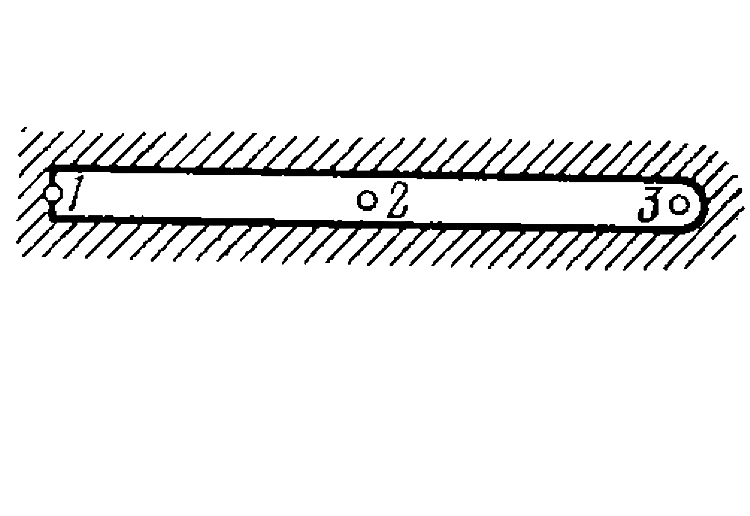A plane monochromatic light wave falls normally on an opaque half-plane. A screen is located at a distance b=100cm behind the half-plane. Making use of the cornu spiral (Fig.) find :
(a) the ratio of intensities of the first maximum and the neighbouring minimum,
(b) the wavelength of light if the first two maxima are separated by a distance Δx=0.63mm.

From th Cornu's spiral, the intensity of the first maximum is given as
Imax,1=1.37I0
and the intensity of the first minimum is given by
Imin=0.78I0
so the required ratio is
ImaxImin=1.76
(b) The value of the distance x is related to the parameter v in Fresnel's intergral by
v=x√2bλ.
For the first two maxima the distance x1,x2 are related to the parameters v1,v2 by
x1=√bλ2v1,x2=√bλ2v2
Thus (v2−v1)√bλ2=x2−x1=Δx
or λ=2b(Δxv2−v1)2
From the Cornu's spiral the positions of the maxima are
v1=1.22,v2=2.34,v3=3.08etc
Thus λ=2b(Δx1.12)2=0.63μm.
Topper's Solved these Questions
- OPTICSBook:IE IRODOV, LA SENA & SS KROTOVChapter:OPTICSExercise:Polarization Of Light
Explore 43 Videos
- OPTICSBook:IE IRODOV, LA SENA & SS KROTOVChapter:OPTICSExercise:Dispersion And Absorption Of Light
Explore 24 Videos
- OPTICSBook:IE IRODOV, LA SENA & SS KROTOVChapter:OPTICSExercise:Interference Of Light
Explore 33 Videos
- MECHANICSBook:IE IRODOV, LA SENA & SS KROTOVChapter:MECHANICSExercise:Mechanics Problems
Explore 92 Videos
- OSCILLATIONS AND WAVESBook:IE IRODOV, LA SENA & SS KROTOVChapter:OSCILLATIONS AND WAVESExercise:Electromagnetic Waves, Radiation
Explore 36 Videos
Similar Questions
A plane monochromatic light wave falls normally on an opaque screen with a long slit whose shape is shown in Fig. Making use of Fig. find the ratio of intensities of light at points 1,2 and 3 located behind the screen at equal distances from it. For point 3 the rounded-off edge of the slit coincides with the boundary line of the first Fresnel zone.


View SolutionA plane light wave wityh wavelength 0.60μm falls normally on a long opaque strip 0.70mm wide. Behind it a screen is placed at a distance 100cm. Using Fig. find the ratio of intensities of light in the middle of the diffraction pattern and at the edge of the geometrical shadow.

View Solution
Knowledge Check
A plane monochromatic light wave falls normally on a diaphragm with two narrow slits separated by 2.5mm. The fringe pattern is formed on a screen 100 cm behind the diaphragm. By what distance will these fringes be displaced, when one of the slits is covered by a glass plate (μ=1.5) of thickness 10μm?
A2mmB1mmC3mmD4mmA plane monochromatic light falls normally on a diaphragm with two narrow slits separated by a distance d = 2.5 mm. A fringe pattern is formed on the screen placed at D = 100 cm behind the diaphragm. If one of the slits is covered by a glass plate of thickness 10μm, then distance by which these fringes will be shifted will be :
A2 mmB3 mmC4 mmD5 mm
A palne monochromatic ligth wave falls normally on a long rectangular slit behind which a screen is positioned at a distance b=60cm. First the width of the slit has adjucted so that in the middle of the diffraction pattern the lowest minimum was observed. After widening the slit by Δh0.70mm, the next minimum was obtained in the centre of the pattern. Find the wavelength of light.
View SolutionA plane monochromatic light wave falls normally on an opaque screen shaped as a long strip with a round hole in the middle. For the observation point P the hole corresponds to half the Fresnel zone, with the hole diameter being η=1.07 times less then the width of the strip. Using Fig. find the intensity of light at the point P provided that the intensity of the incident light is equal to I0.

View SolutionA plane monochromatic light wave with intensity I0 falls normally on an opaque screen with a round aperture. What is the intensity of light I behind the screen at the point for which the aperture
(a) is equal to the first Fresnel zone, to the internal half of the first zone,
(b) was made equal to the first Fresnel zone and then half of it was closed (along the diameter) ?
View SolutionTwo slits are made on an opaque surface at a separation of 1mm beetween them. A screen in placed at a distance of 1m from the plane of slits. Find the separation between two consecutive maxima. Wavelength of light being used in the experiment is 500 nm.
View SolutionA plane monochromartic light wave falls normally on a diaphragm with two narrow slist separated bya distance d=2.5mm. A fringe pattern is formed on a screen placed at a distance l=100cm behind the diaphragm. By what distance and in which direction will these fringes be dispalced when one of the slits is covered by a glass plate of thickness h=10μm?
View SolutionPlane monochromatic light with intensity I0 falls normally on an opaque disc closing the first Fresnel zone for a point on the screen in front of the wave front. What would be the intensity I at the same point if (a) half of the disc along the diameter were removed, (b) half of the external half is removed along the the diameter ?
View Solution

